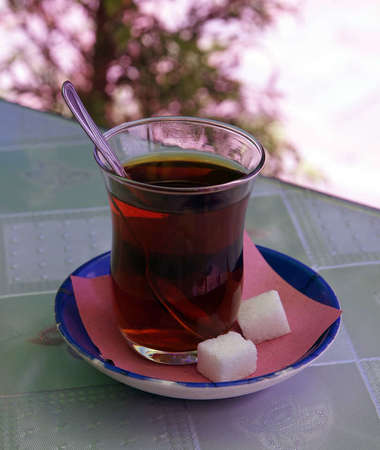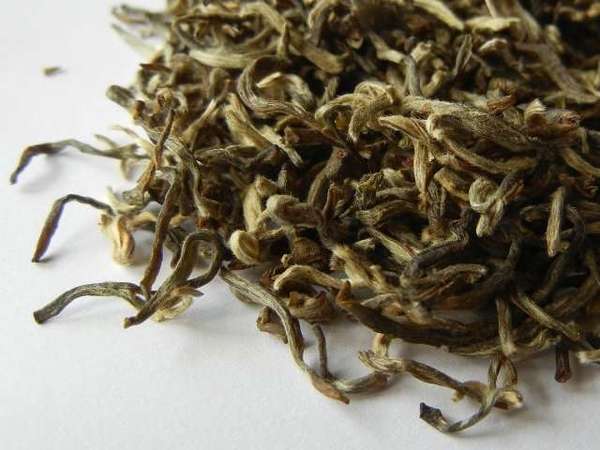Calories in Tea - With and Without Milk or Sugar
Last Updated: May. 3, 2018Tea, when nothing is added to it, has negligible, but not zero calories. According to the USDA Nutrient Database (where all the figures here come from), a typical 8oz. cup of brewed black tea has 2.4 calories, which is almost nothing compared to the Recommended Daily Intake(RDI) of 2000 calories for a typical adult. The calories come mostly from trace amounts of carbohydrates in the tea leaf. The same is true for most herbal teas.
However, milk and sweeteners can add significant amounts of calories to tea. Bottled teas are particular culprits, often containing large amounts of added sugars. If you are concerned with reducing intake of empty calories from added sugars, avoiding sweetened bottled teas, drinking freshly brewed tea, and seeking out high-quality tea that tastes good unsweetened is a best practice.
 Adding sugar to tea adds calories but no other nutritional value. Photo by Sandstein, licensed under CC BY 3.0.
Adding sugar to tea adds calories but no other nutritional value. Photo by Sandstein, licensed under CC BY 3.0.Sugar adds empty calories
A typical teaspoon of refined (white) sugar amounts to about 4 grams of sugar, which has 15 calories. A typical sugar cube is about 2 grams, which has about 9 calories, and a typical sugar packet, like those served with tea or coffee in some restaurants, has about 3 grams, or 11 calories.These calories are empty, meaning that they impart no other nutritional value: no vitamins, minerals, or protein.
Milk adds calories and nutrients
Milk or cream can contribute to the calories in tea, but the total amount contributed is usually small relative to the dairy products people consume in food. These calories come from both sugars (like lactose, naturally occurring in dairy products) and fat in non-skim milk. One fluid ounce of whole milk (a lot more than most people put in their tea) has only 18 calories, 9 of which are from fat. Half-and-half has 39 calories per fluid ounce, 30 of which are from fat. Skim milk has 10 calories per fluid ounce, none of which is from fat. Even adding cream, using the typical amount people add to their tea is unlikely to contribute largely to calories.Unlike sugar, milk also adds significant nutritional value. Milk contains protein, about 1 gram per fluid ounce, and some vitamin A, and also is a good source of calcium. In the U.S. and many other countries, milk is also fortified with Vitamin D. Vitamins A and D are both fat-soluble vitamins, so they are not well-absorbed from skim milk.
Bottled teas can be very high in sugar and calories
Bottled teas, or so-called ready-to-drink teas, which have been brewed and packaged ahead of time, are often sweetened, sometimes heavily so. A study by the consumer watchdog Choice found a number of bottled teas that had over 10 teaspoons of sugar per bottle...that's over 150 empty calories, more than a 12 oz. can or bottle of Coca-cola. Although we recommend brewing your own tea from loose-leaf or tea bags, if you do seek bottled teas we recommend looking for unsweetened ones. Traditional teas from Asian cultures like this loose-leaf Chinese green tea often taste better unsweetened. Photo © Alex Zorach.
Traditional teas from Asian cultures like this loose-leaf Chinese green tea often taste better unsweetened. Photo © Alex Zorach.Teas that taste better without sugar or milk
If you feel the desire or need to sweeten your tea, you may wish to consider looking at naturally sweet teas. Higher grades of tea often are naturally sweeter, although also more expensive. If you are only used to drinking black tea, you may wish to consider exploring green, white, or oolong teas, many of which can have naturally sweeter, smoother, and less bitter flavors.Many of the strong black breakfast teas that dominate the tea-drinking cultures in Western countries have been selected for their ability to pair well with milk, cream, or sugar. Asian cultures generally drink their tea pure and unsweetened, and the teas from this culture may taste better to you in this format.
Learning to appreciate unsweetened tea
You can also train yourself to appreciate the more bitter, subdued flavor of unsweetened tea. Humans naturally have aversions to bitter flavors, because many poisons are bitter. Bitterness thus serves as a natural cue to help protect people against poisoning themselves.[2]People can also have an initial dislike of new foods, called food neophobia, which is most evident in children but can also manifest in adults. Even if your initial reaction to a bitter drink like unsweetened tea is negative, as you become more familiar with a particular food that tastes bitter, your aversion to it will diminish and you can even come to enjoy the bitterness. To experience this sort of transition with tea, try sipping your tea unsweetened each time you prepare it, before sweetening it. You may find that you come to use less sweetener over time, or that you even come to enjoy drinking your tea straight.
Don't fear or obsess over calories
Even if you decide you like drinking your tea with milk, cream, or sugar, you don't need to obsess over the small amount of calories in it. The tea itself contributes a negligible amount of calories, and if you're adding only a single cube or teaspoon of sugar, the contribution from the sugar is not worth worrying about.The practice of counting calories and obsessing over the nutritional details of each food can itself become more destructive than the calories themselves. There are numerous ways calorie counting can be unhealthy and some even consider it to be, or contribute to eating disorder. Remember that calories are a measure of the body's natural energy source in the diet. Tea is healthy and even sweetened tea can be part of a healthy diet and lifestyle.
References
1. USDA National Nutrient Database
2. Tim Jacob, The Physiology of Taste, Cardiff University, UK. Retrieved Aug. 9, 2013.

